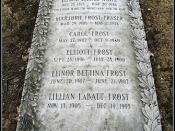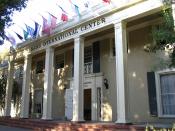It is hard to imagine that American English is closer to that of Shakespeare than the English of London. Roberts asserts this, but offers no explanation. However, we (and they) typically think of American English versus London English (is that English English?) as simply the difference in pronunciation"ÃÂ"to-mA-to" versus "to-mOtto". The differences must run far deeper, including lexicon, sentence structure, implications, interpretation, and more.
Roberts provides an explanation for the process of speech evolution, and ties it largely to the process of young people moving among various communities (speech communities), including home, neighborhood, preschool, high school, college, and professional career. He suggests that speech styles and patterns may be the first and most direct measure of an individual's class affiliation. Words and phrases such as, "ain't....., I seen him....., he don't.....", and so on quickly label the speaker as one using (what we today consider) colloquialisms. Even so, "ain't" appears closer to acceptable mainstream American English"ÃÂit's even in the dictionary, ain't it? Roberts says, "We speak of America as the melting pot, but the speech communities of this continent are very far from having melted into one."
One must ask if this could ever happen, and more importantly, if it's desired. Certain segments of America revel in their unique speech adaptations, and apparently work to maintain uniqueness as a form of social and ethnic identity through speech identity.
Later, Roberts says that language differences in America tend to correlate with education or profession rather than with birth. In America, an individual can move to a different class level by personal effort"ÃÂthe hallmark of a meritocracy"ÃÂrather than by birthright. But in England, language and class are riveted together and indelibly define one's life and lifestyle.
Roberts asks if one type of English is better than another, and concludes that the best English is wherever the discourse occurs. He further suggests that the very best English can be found at San Jose State College.
Roberts asserts that the characteristics of good English are clarity, and precision. He also suggests that our portrayal of "better" is related to our characterization of the society that speaks in a manner with whom we wish to identify. We label ourselves (create our identity) by our speech patterns. In other words, "...correct speech is that which sounds normal and natural to one's comrades."





